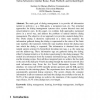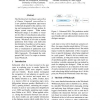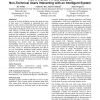6 search results - page 1 / 2 » Predicting and Managing Spoken Disfluencies During Human-Com... |
102
Voted
NAACL
1994
15 years 28 days ago
1994
This research characterizes the spontaneous spoken disfluencies typical of human-computer interaction, and presents a predictive model accounting for their occurrence. Data were c...
103
Voted
LREC
2010
15 years 1 months ago
2010
We present Witchcraft, an open-source framework for the evaluation of prediction models for spoken dialogue systems based on interaction logs and audio recordings. The use of Witc...
98
Voted
HCI
2009
14 years 9 months ago
2009
The main goal of dialog management is to provide all information needed to perform e. g. a SQL-query, a navigation task, etc. Two principal approaches for dialog management systems...
SIGDIAL
2010
14 years 9 months ago
2010
The Workbench for Intelligent exploraTion of Human ComputeR conversaTions is a new platform-independent open-source workbench designed for the analysis, mining and management of l...
CHI
2007
ACM
16 years 10 hour ago
2007
ACM
In order to develop intelligent systems that attain the trust of their users, it is important to understand how users perceive such systems and develop those perceptions over time...




